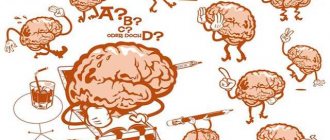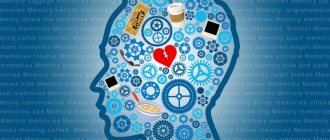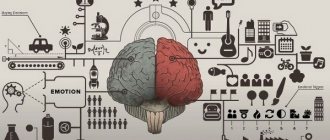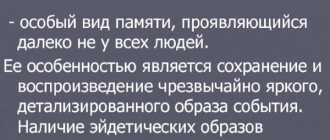What are memory and attention?
Everyone has a memory. Another thing is that not everyone knows how to use it correctly. We remember a lot of facts, images and figures. Without memory, life would look completely different.
For what reason, then, are we able to remember one person, but are unable to retain the name or date of birth of another for a long time? Do we easily remember the time of one meeting and are forced to write down the date of another?
Everything is simpler than it seems at first glance. If we remember something well, it means that effective memorization methods were used in this case. This happened either consciously or on an unconscious level. If you couldn’t remember, then the method turned out to be inappropriate.
Attention and memory are closely interrelated. Without the ability to concentrate attention on what must be memorized, as well as without an emotional reaction from studying a certain object, it is impossible to learn the material qualitatively. At its core, attentiveness, like interest, are the main indicators of good short-term memory performance.
Attention is the ability for selective perception. It regulates the fixation of an object in a person’s short-term memory. It is characterized by a short storage time of the received information in a small volume. The stronger and longer our concentration on an object, the better we can remember it.
Exercises to develop memory and thinking
- Reading
. Unfortunately, modern people have little time to read. We increasingly prefer short notes on social networks, while large texts seem like an impossible task to us. This leads to the fact that thinking and memory begin to work worse.Make it a rule to read through texts on serious topics that require analysis at least twice a week. You need to not just read them, but remember the main idea. In addition to articles, classical, psychological and philosophical literature, as well as those related to professional activities, are well suited. It happens that we seem to be reading, but we cannot remember the last paragraph or page. In this case, go back and re-read, get your brain working.
- Remember the routes
. Once you find yourself in an unfamiliar place, try to remember how to get back here. During the trip, pay attention to what surrounds you, try to remember the signs of streets and cities. For better memorization, associate objects with some emotion. - Intellectual games
help develop memory well : checkers, chess, puzzles, various board economic games. - Remember your account passwords
. Of course, you also need to write them down; by writing them down, you help yourself remember them. Use different passwords and nicknames, trying not to access your records, but to remember them. Numbers and names can be linked to certain images. - It is believed that to improve memory you need to learn poems
. We will offer a slightly different method. The fact is that it’s good to learn poems if you know that they will be useful to you, therefore, in order not to pollute your memory, but at the same time develop it, let’s do the following exercise: read the poem and, without peeking, put it in your own words. For adults, this task is more enjoyable and will help them learn to think outside the box. - Remember what happened to you during the day
. Try to imagine the sights, sounds, words and emotions, as well as the people you met along the way. This exercise will help develop analytical thinking, as well as sum up the results of the day.
Reasons for distraction
Before considering the issue of concentration, it is important to understand the causes of absent-mindedness.
According to Daniel Kahnman, there are 2 levels of thinking:
- The subconscious is a layer that functions without volitional effort. Reacts to a number of stimuli and is impulsive.
- Consciousness is a group of critical and rational thought processes. Performs a processing function for impulses emanating from the subconscious.
The conscious level is responsible for all processes where logic and the use of volitional efforts are necessary. When it comes to reflexes and reactive behavior, this is the work of the subconscious level.
The level of consciousness system is responsible for all thought processes. With its help we are able to concentrate on the task.
Our conscious thinking is subject to multiple influences from external interference, which makes the process of focusing much more difficult.
What irritants are there?
There are two types of irritants:
- Sensory - music, TV, people, and so on. You can easily get rid of them by physically eliminating them.
- Emotional - dialogue with oneself, a continuous stream of thoughts and the like. Caused by life problems, stress, health conditions.
To get rid of them, you can try to resort to volitional efforts, forget about pressing problems, focus on the task, but this depletes mental reserves.
There is another way to cope with emotional stimuli. This requires an understanding that the human mind tends to focus on negative experiences and events because they pose a threat and therefore require increased attention. Subconsciously, a person strives to erase them as quickly as possible.
It would be a mistake to try to remove the source of negative influence. In this case, you should have a good rest, recuperate, and make negative events your motivation to get out of the current situation as quickly as possible.
What helps and what hinders memorization?
Motivation is an important component in the process of memorizing any amount of information. To stay focused, always use self-motivation.
For example, the task is set to remember this material. This will bring great benefits in the future for your self-development, career, family. Speak out all the benefits of studying and applying this information. The more you feel the need for these actions, the more effective the memorization process will be.
You will find everything about motivation in the article: “What is positive motivation and how it will move mountains for you.”
External noise. Are you able to concentrate on work when there is turmoil all around? Most often it is an acquired skill, a habit.
If a person lives in a small apartment or student dormitory, his brain is forced to adapt to difficult conditions and do its work without paying attention to external stimuli.
Difficulties make us stronger. To increase your “impenetrability” threshold, I recommend artificially creating difficulties for yourself. For example, concentrate on reading while music is playing in your headphones, write a progress report while sitting in McDonald's, where people are walking around and making noise. This will tire you out faster, but the results will not be long in coming.
It's a pity there is no Mr. and Mrs. Impenetrable award. I’m sure you could claim first place after such training.
Is there any benefit to learning poetry by heart?
We learn poems in kindergarten, at school, even at university; if we are preparing for performances or concerts, the presenters learn their words.
We were told that the more we learn poetry and monologues, the better our memory will be. Is it so? Scientists at Columbia University studied more than 300 students and found that there was no particular connection between learning poetry and the activity of the limbic system. Students who studied without desire, interest and pleasure could not concentrate on learning something new; they had weak short-term memory, unlike students who did not cram.
Neurolinguist Professor Bernhard Schmidt says:
If poems are not memorized by themselves (and there are people with a unique memory who simply memorize large volumes of text verbatim without effort), there is no need to torture yourself, it will not do anything for your brain. Just love poetry, read poetry, rhythmic forms have a positive effect on the brain and our memory, but it is not at all necessary to keep all this in your skull.
A similar opinion has developed about writing poems (as well as about learning): choosing rhymes for a poem does not improve brain function. There are people who have a good selection of rhymes - a feature of the brain.
Scientists now believe that it is much more effective to find rarely used information instead of memorizing it. Neurologist Anna Gorenkova is inclined to believe that the brain of a modern person is overloaded, so it is advisable to entrust some work to modern devices. Of course, various basic knowledge about the world, sciences, one’s own profession, the use and structure of technology is important. There's no point in trying to remember everything in the world because it won't make your brain feel any better.
The reverse reading technique has been criticized. Anna Gorenkova draws attention to the fact that the brain is injured during this training, namely, the usual assimilation of material/information is disrupted and, of course, this is stress for neurons.
Ways to improve concentration
There is a lot of controversy regarding modern learning systems, since it is extremely difficult to objectively track improvements among users. There is an online service Vikium ru, which allows you to develop memory, attention and thinking in general in a convenient and simple way, in any place convenient for you.
In order to learn the technique of turning on and controlling voluntary attention, you should do special exercises. They help you gain concentration.
Of course, good concentration cannot be achieved instantly; you need to regularly work to improve its level.
Tips for improving concentration:
- Remain steadfast. Very often a person stops halfway and succumbs to the temptation to avoid working on himself. Try to overcome this desire, for example, by applying the rule of five. If you have to read a book, finish five more pages or use 5 more minutes of your time on this task. As a result, you may want to keep reading.
- Do only one thing at a time. All other issues can wait. Miller's Rule states that our available attention span is extremely limited.
- Always color the activity with emotions. When memorizing information, both attention and emotional return from the actions performed are important. Even to the point of inventing a game: every 5 pages of text is an opportunity to throw 5 paper balls into a waste basket.
Meditation and attention
There are many tutorials, online courses and programs for training memory, attention and concentration. In this article I will present some of them. You can learn more about the variety of exercises from the article on the blog TOP 10 exercises for developing human memory.”
The best way to concentrate is meditation. Ideally, such training should become a habit. Entry level – green dot exercise. It can be done at any time of the day and anywhere.
Description of the green dot technique:
- Relax your body. This is possible when you are sitting in front of the computer or during your lunch break.
- Imagine a green dot on the wall in front of you.
- Stare at an imaginary point for 3 minutes. Gradually increase the time, expanding your “comfortable” zone.
- Pay attention to your periphery and what is to your side. Keep everything around you in your area of attention. At the same time, do not move your eyes from the imaginary “green dot”.
This is a simple but extremely effective way to quickly learn to concentrate. The result is improved memory.
In general, meditation is a very powerful practice; if you adopt it, the effectiveness of any person will increase significantly. You can read more about meditation in the article: What is meditation and what will it give to the common man.”
Memory and attention training exercises for adults
In this section of the article we will show exercises for training memory and attention in adults. You can choose one of the best options:
- Free online brain trainers. There are hundreds of different simulators on the Internet that develop memory and attentiveness. One of these simulators is Wikium. In the article “What is Wikium” we told you how to use the simulator.
- Reading books. It is important to read books not only to learn about new words, but also to develop memory. You can read both Russian and English books. When reading books, you remember the written text and reproduce the picture from the book in your head.
- Solving mathematical problems. Special services help with this, where you can find examples of problems and solve them without a calculator. It is enough to take a simple example and calculate the answers in your head.
Ryuta Kawashima's Intelligence Development System
Japan is known for progress in almost every field. It was here that the Japanese system of intelligence development was developed.
According to Ryuta Kawashima's original method, solving simple timed arithmetic problems and reading aloud engages all hemispheres of the brain. In this way, memory is trained and developed, and negative consequences are erased. Reading helps slow down brain aging.
The author conducted an experiment among mentally ill patients suffering from dementia and Alzheimer's disease. After 30 days of training according to the Kawashima system, patients showed a slowdown in the development of the disease. Brain function improved significantly. It was previously almost impossible to delay the suppression of cognitive functions in this disease. The author's book itself consists of a number of simple arithmetic tasks, visual illustrations and comments.











